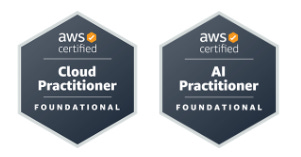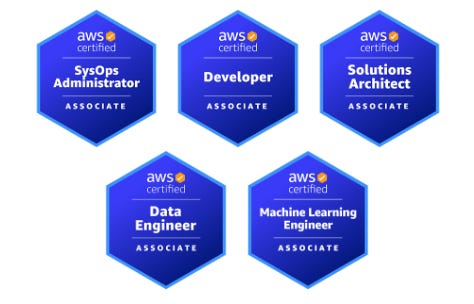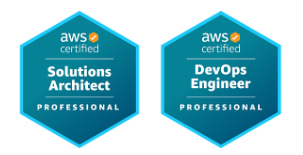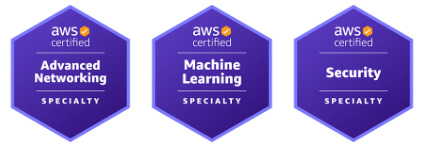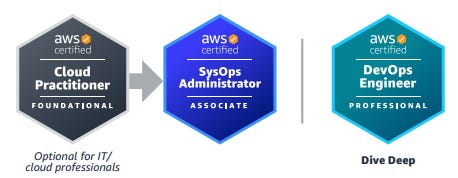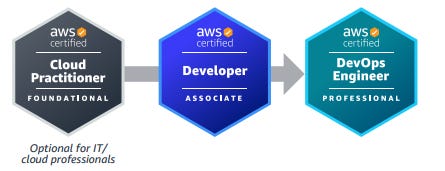AWS Certification Paths in 2025
Which AWS Certification Should You Pursue in 2025?
As cloud computing continues to grow, AWS (Amazon Web Services) is still on the top of the go-to cloud providers for many businesses. Whether you’re starting your career or looking to advance in the cloud space, AWS certifications are a great way to prove your skills and open up new job opportunities.
Cloud Certifications Matter, But Why?
At first, certifications help employers and recruiters know that you have the skills needed to work with AWS services and solve real-world problems.
However, in my opinion, certifications by themselves are not enough — especially when they’re not accompanied by practical skills or experience in the field. That said, they still offer significant value. To me, certifications provide confidence and offer an organized, structured way of learning new concepts. Additionally, because of the effort required to obtain them, they send a clear signal that you’re committed to the field and eager to learn new things or enhance your skills.
For me, that’s what sets you apart.
With so many certifications to choose from in 2025, it can be hard to know where to start. In this article, I’ll explore the different AWS certification paths to help you — just as they helped me — decide which one is right for you. In my case, I’m focusing on security, but there are different approaches to get there, and I’ll share my point of view.
AWS Certification Levels: A Simple Breakdown
AWS offers certifications at different levels, based on prior experience or knowledge, from beginner to expert, and in a variety of fields. These are:
Foundational: Knowledge-based certification for foundational understanding of AWS Cloud. No prior experience needed.
Associate: Role-based certifications that showcase your knowledge and skills on AWS and build your credibility as an AWS Cloud professional. Prior cloud and/or strong on-premises IT experience recommended.
Professional: Role-based certifications that validate advanced skills and knowledge required to design secure, optimized, and modernized applications and to automate processes on AWS. 2 years of prior AWS Cloud experience recommended.
Specialty: Dive deeper and position yourself as a trusted advisor to your stakeholders and/or customers in these strategic areas. Requires advanced experience.
AWS Certification Paths: Based on Roles
Here are some of the leading cloud job roles, their responsibilities, and the corresponding AWS certification paths that align with each role.
Solutions Architect: Design, develop, and manage cloud infrastructure and assets, work with DevOps to migrate applications to the cloud.
Application Architect: Design significant aspects of application architecture including user interface, middleware, and infrastructure, and ensure enterprise-wide scalable, reliable, and manageable systems.
Cloud Data Engineer: Automate collection and processing of structured/semistructured data and monitor data pipeline performance.
Systems Administrator: Install, upgrade, and maintain computer components and software, and integrate automation processes.
Cloud Engineer: Implement and operate an organization’s networked computing infrastructure and Implement security systems to maintain data safety.
Test Engineer: Embed testing and quality best practices for software development from design to release, throughout the product life cycle.
Cloud DevOps Engineer: Design, deployment, and operations of large-scale global hybrid cloud computing environment, advocating for end-to-end automated CI/CD DevOps pipelines.
DevSecOps Engineer: Accelerate enterprise cloud adoption while enabling rapid and stable delivery of capabilities using CI/CD principles, methodologies, and technologies
Cloud Security Engineer: Design computer security architecture and develop detailed cyber security designs. Develop, execute, and track performance of security measures to protect information.
Cloud Security Architect: Design and implement enterprise cloud solutions applying governance to identify, communicate, and minimize business and technical risks.
Network Engineer: Design and implement computer and information networks, such as local area networks (LAN), wide area networks (WAN), intranets, extranets, etc.
Prompt Engineer: Design, test, and refine text prompts to optimize the performance of AI language models.
Machine Learning Engineer: Research, build, and design artificial intelligence (AI) systems to automate predictive models, and design machine learning systems, models, and schemes.
Machine Learning Ops Engineer: Build and maintain AI and ML platforms and infrastructure. Design, implement, and operationally support AI/ML model activity and deployment infrastructure.
Data scientist: Develop and implement AI/ ML models to solve business problems. Train and fine tune models and evaluate their performance.
Whats next?
In the coming days, I’ll be adding useful resources on how to prepare for AWS certifications, including courses, hands-on labs, and practice exams, as well as Azure certification roadmaps and paths.
I hope this information helps you choose the right direction to enhance your cloud career (specifically regarding AWS), or at least encourages you to start thinking about it.
I’ll be posting content weekly. You can follow me here for updates, and you can also contact me on LinkedIn. Comments appreciated!
Also please let me know if you’re preparing for a specific one in the comments
Thanks for reading! If you enjoyed this content, feel free to click the ❤️ so more people can discover this Substack.
References:
All the images and information comes from AWS Certification Overview — Amazon Web Services (AWS). Retrieved from https://aws.amazon.com/certification/



